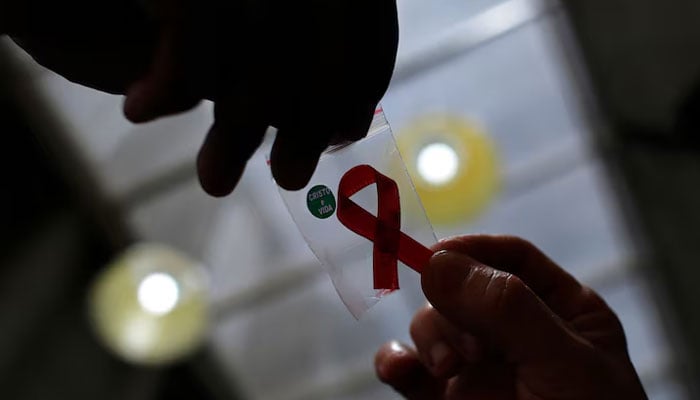HIV epidemic worsens in Pakistan with over 1,000 monthly infections
Punjab records highest number of new infections, with 5,691 cases detected between January and September 2024
December 28, 2024

- Over 9,000 people diagnosed with HIV between Jan, Sept 2024.
- Total number of HIV cases for this year could surpass 12,950.
- Experts note major spillover of deadly infections from high-risk populations.
ISLAMABAD: Pakistan is facing a troubling increase in the cases of human immunodeficiency virus (HIV), with officials from the Ministry of National Health Services reporting 1,079 new infections each month.
According to the ministry on Friday, in the first nine months of 2024 alone, 9,713 individuals tested positive for the deadly virus.
If this trend continues, the total number of HIV cases for this year could surpass 12,950, a stark rise from the 12,731 cases recorded in all of 2023, The News reported.
The statistics reveal alarming demographic trends, with men accounting for 69.4% of new cases, women for 20.5%, transgender individuals for 4.1%, and children for 6%.
Punjab recorded the highest number of new infections, with 5,691 cases detected between January and September 2024, averaging 632 new cases each month.
Sindh followed with 2,383 new cases, averaging 265 monthly, while Khyber Pakhtunkhwa (KP) reported 926 cases, translating to an average of 103 cases per month.
Balochistan recorded 329 new cases, while Islamabad and Azad Jammu and Kashmir (AJK) reported 378 and 10 cases respectively.
Comparatively, the figures for 2023 were even higher, with 12,731 new infections reported nationwide, but the consistent rise in monthly averages for 2024 reflects the worsening nature of the epidemic.
Alarmingly, experts have noted a significant spillover of HIV infections from high-risk populations to the general population.
This is attributed to factors such as poor Infection Prevention and Control (IPC) at healthcare facilities, unsafe sexual practices, low awareness, stigma and other risky behaviors.
"Despite collective efforts, the HIV epidemic is increasing in Pakistan. This demands innovative and sustainable interventions," said Trouble Chikoko, the UNAIDS Country Director for Pakistan, during a recent meeting with the Ministry of Religious Affairs.
Chikoko emphasised the pivotal role that religious scholars and institutions could play in raising awareness about HIV prevention and reducing stigma.
"Collaboration with UN agencies and partners is essential to address this crisis comprehensively," he said.
Commenting on the HIV situation in Pakistan, the Common Management Unit (CMU) for HIV, TB, and Malaria has highlighted its ongoing efforts to curb the epidemic, claiming that 94 Anti-Retroviral Therapy (ART) centers have been established across the country to provide testing and treatment services.
Additionally, awareness campaigns have been launched through mass and social media, including multilingual radio messages and city-branding initiatives to destigmatise HIV testing and treatment.
Advocacy efforts involving key government officials and stakeholders have also been undertaken to mark events like World AIDS Day, CMU officials added.
However, these measures have faced challenges.
The CMU has reported that it is expanding its harm-reduction programs, particularly targeting IDUs, by providing clean needles and syringes. However, the scale of these programs remains inadequate given the increasing number of new infections.
The provincial breakdown of cases underscores the need for localised responses. Punjab, with the highest number of new infections, has been urged to intensify its prevention and awareness campaigns, particularly in urban centers where high-risk behaviors are more prevalent.
Similarly, Sindh’s efforts to reduce new infections have shown some progress compared to the previous year, but the numbers remain concerning, especially in Karachi and Hyderabad.
Islamabad’s significant drop in new cases, from 611 in 2023 to 378 in 2024, has been attributed to targeted campaigns and improved ART coverage. However, experts caution against complacency, warning that the capital’s success needs to be replicated nationwide to reverse the overall trend.
UNAIDS and CMU officials stress the need for greater community engagement to address stigma and misinformation surrounding HIV. "Community involvement is vital for raising awareness and encouraging testing and treatment," said Chikoko.
With over 1,000 new cases reported monthly, Pakistan is nearing a generalised HIV epidemic. Public health experts urge the government to increase resources for prevention and treatment while addressing barriers to care.











